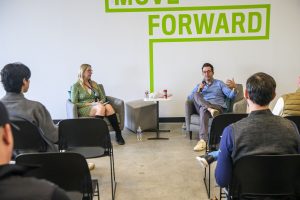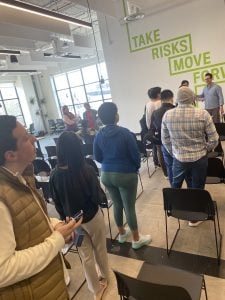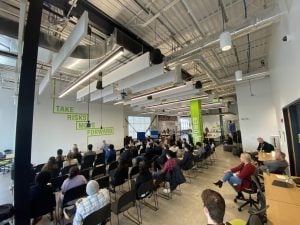
It began like many student startups, a product of dorm room conversations and contemplation about consumer pain points in the world. Unlike most startups, it reached a $3 billion valuation and became a household brand.
Warby Parker co-founder Jeff Raider (Krieger School of Arts & Sciences, ’03 and School of Advanced International Studies, ’04), traveled to Baltimore this spring, back to his alma mater, for an “Ask Me Anything” session with Johns Hopkins students. In conversation with Christy Wyskiel, head of commercialization and entrepreneurship programs, he took in the evolution of FastForward U, the hub for student ventures and a part of Johns Hopkins he has been keen to support.
 Despite Jeff’s wild success with Warby Parker and then Harry’s Razors, among other brands, his story was down-to-earth: Four friends from the Wharton School of Business, undeterred by false starts and less-than-enthusiastic support from advisers at Wharton, saw what was wrong with the pricey eyewear world and were determined to fix it. They were validated by the flash sale of 100 pairs of glasses online, but Jeff admits that honing the model took time. He credits a business school professor with helping them settle on the “Netflix model,” in which frames are sent home for customers to try on.
Despite Jeff’s wild success with Warby Parker and then Harry’s Razors, among other brands, his story was down-to-earth: Four friends from the Wharton School of Business, undeterred by false starts and less-than-enthusiastic support from advisers at Wharton, saw what was wrong with the pricey eyewear world and were determined to fix it. They were validated by the flash sale of 100 pairs of glasses online, but Jeff admits that honing the model took time. He credits a business school professor with helping them settle on the “Netflix model,” in which frames are sent home for customers to try on.
Warby Parker, founded in 2010, is a public company now (WRBY on the New York Stock Exchange), with 200-plus stores across the country and a popular online presence, where one can now try on frames virtually, with the aid of smartphone or computer cameras. Jeff has gone on to found Harry’s Razors and Cat Person and he just bought the company that makes Lume, a full-body deodorant.
Jeff humbly reflected on several critical lessons for student founders:
- Before they built the company, contrary to conventional thinking that ideas need to be kept under wraps until they’re fully cooked, Jeff and his co-founders began to talk about their idea to everyone. For months, they listened to what people thought about the market they were hoping to enter — and fix.
- The idea itself is not what will make you succeed, but rather the execution of that idea.
- It’s crucial to focus on the problem, and not be wedded to one’s own solution. In other words, take ego out of the equation, stay close to your customer, and be flexible and open to innovation throughout the process.
- Put friendships first. Unlike so many partners in startups, Jeff is still close friends with his three co-founders. He believes that putting friendship first will result in good business decisions.

While on campus, Jeff also heard from three student teams, all in the consumer goods space, who are receiving support via FastForward U. Tastee Tape is developing an edible tape to ensure mess-free meals; NovvaCup is developing a convenient, reusable menstrual cup; and Drul is developing an at-home, saliva-based test for common oral diseases. For information about student programs, visit FastForward U.